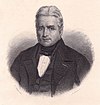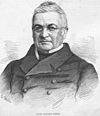|
Nicolas Joseph Maison
Nicolas Joseph Maison, marquis de Maison (French: [nikɔla ʒozɛf mɛzɔ̃]; 19 December 1771 – 13 February 1840) was a French military officer who served in the French Revolutionary Wars, the Napoleonic Wars, and as commander of the Morea expedition during the Greek War of Independence. He was made a Marshal of France in 1829 and served as Minister of War from 1835 to 1836.[1] Revolutionary Wars and Napoleonic Wars Nicolas-Joseph Maison was born in Épinay-sur-Seine, near Paris on 19 December 1771. He enlisted in the Army in 1789 and on 1 August 1791, he was named captain in the 9th Battalion of Volunteers of Paris and served in the infantry in the early French Revolutionary Wars. He served as aide-de-camp to Minister of War Jean Bernadotte in 1799.[1] In 1805, he joined the I Corps of the Grande Armée assembled by Emperor Napoleon I and participated in the Battle of Austerlitz. During the campaign of 1806, he served as a General de brigade in the corps of Marshal Bernadotte and took part in the chase of the Prussian army to Lübeck after their defeat at Jena. In 1808 he was sent to Spain where he served under Marshal Victor and was wounded at the capture of Madrid. In 1812 he joined Napoleon in the invasion of Russia. At some point in the invasion Marshal Michel Ney saved his life, a deed he would later repay by refusing to join the court-martial which in 1815 was assembled to judge Ney after the Hundred Days.[2] At the Beresina he was promoted to General de division and made a baron of the Empire.[1] After the wounding of Marshal Oudinot, he took over command of the II Corps and led it during the retreat to the Weischel. He served in the campaign of 1813 and after Marshal Jacques MacDonald's defeat at the Battle of Katzbach was once again tasked with leading the retreat. After the Battle of Leipzig, where he was wounded, he was given the Grand Cross of the Légion d'honneur and was made a count of the empire.[3] In 1814, he was tasked with defending what is now Belgium and the port of Antwerp. With inadequate forces, he managed to hold his own against greatly superior Allied forces and defeated Johann von Thielmann's Saxons at the Battle of Courtrai.[1] Bourbon restorationAfter the abdication of the emperor, Maison rallied to Louis XVIII of France, who made him a Knight of St. Louis and appointed him Governor of Paris. During the Hundred Days, Maison stayed loyal to the Bourbons and joined them when they fled to Ghent. After the Second Restoration, he was made commandant of the 1st Military Division. He was put on the court martial appointed to judge Marshal Ney on a charge of treason for joining Napoléon but after he and his colleagues declared themselves incompetent he was demoted to command of the 8th Military Division in Marseilles. In 1817, Maison was created a marquis and a Peer of France by Louis XVIII.[1]   In 1828, he was given command of the French expeditionary corps in Morea (the Peloponnese peninsula in Greece).[1][4] This expedition consisted in a land intervention of the French Army in the Peloponnese at the time of the Greek War of Independence, with the aim of liberating the region from the Turkish-Egyptian occupation forces commanded by Ibrahim Pasha.[5] The military expedition was also accompanied by a scientific expedition mandated by the French Academy. After the soldiers took control of the principal strongholds held by the Turkish troops (Navarino, Modon, Coron and Patras), General Maison was created a Marshal of France by Charles X on 22 February 1829.[6][7][8][9] Although he returned to France after 8 months, the French kept a military presence in the area until 1833. He left Greece on 22 May 1829.[5] Later lifeIn 1830, Maison supported the July Revolution and served in November 1830 as Minister of Foreign Affairs for a couple of weeks, before being sent to Vienna as ambassador. In 1833 he was made ambassador to Russia in St. Petersburg. Maison served as minister of war from 30 April 1835 to 19 September 1836 after which he retired from public life.[1] Nicolas-Joseph Maison died in Paris on 13 February 1840. He is buried in the Père Lachaise Cemetery (division 5).[1] Honors, military grades and decorations
Political officesSee alsoReferences
Bibliography
External links
|
||||||||||||||||||||




